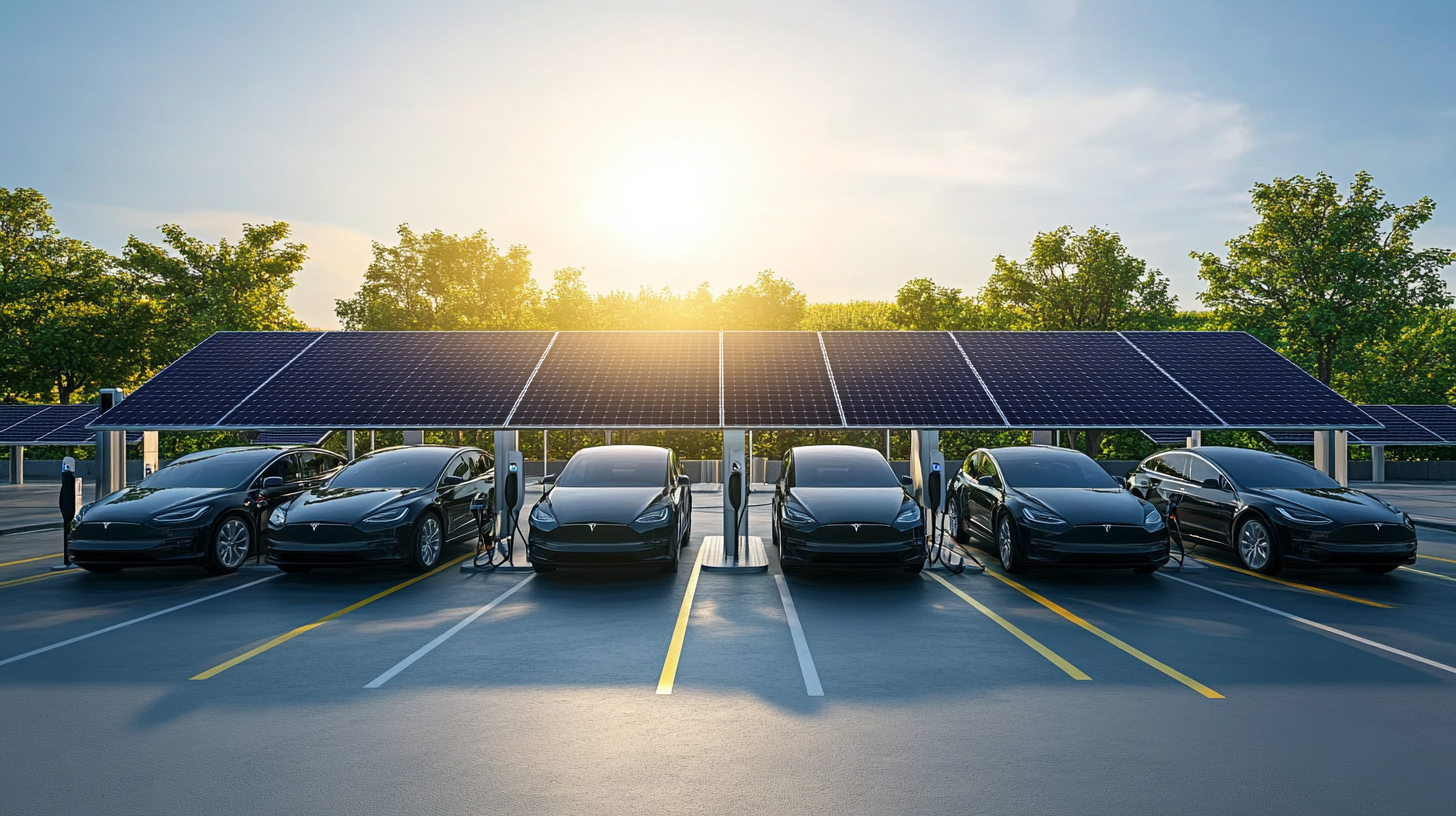In recent years, the demand for electric vehicles (EVs) has surged, driven by a global push for sustainability and reduced carbon emissions. As more consumers shift towards these eco-friendly options, the need for efficient and convenient charging solutions becomes increasingly critical. Enter the Solar Powered EV Charging Station, an innovative solution that not only supports the growing EV market but also harnesses the power of renewable energy. This synergy offers a unique opportunity for global buyers looking to invest in environmentally responsible technology that aligns with forward-thinking policies and consumer preferences.
The benefits of integrating solar energy into EV charging infrastructure are remarkable and extend beyond mere convenience. By utilizing a Solar Powered EV Charging Station, users can reduce their carbon footprint, take advantage of cost savings, and contribute to a sustainable future. This blog will explore seven significant advantages of solar-powered charging stations, emphasizing why they represent a smart investment for buyers around the world aiming to stay ahead in an evolving market. From enhancing grid stability to promoting energy independence, the potential of these cutting-edge charging solutions is immense and deserves attention.

As the world increasingly shifts towards sustainable energy solutions, solar-powered EV charging stations have emerged as a game-changer for eco-conscious consumers. These innovative stations harness the sun's energy, allowing electric vehicle owners to charge their cars without relying on fossil fuels. This not only reduces the carbon footprint but also promotes a greener lifestyle, making it an appealing choice for individuals who prioritize environmental responsibility.
One of the most significant benefits of solar-powered charging stations is their cost-effectiveness. By utilizing solar energy, users can significantly lower their electricity bills and, in many cases, charge their vehicles for free during daylight hours. Additionally, these stations often qualify for government incentives aimed at supporting renewable energy initiatives, further enhancing their economic appeal. By opting for solar, consumers invest not only in their vehicles but also in a sustainable future.
Moreover, solar-powered EV charging stations offer enhanced energy independence. By generating their own energy, users are less vulnerable to fluctuations in the energy market and potential supply interruptions. This autonomy allows eco-conscious consumers to take charge of their energy consumption and supports the growing movement towards localized, renewable energy systems. With their clear environmental benefits and economic advantages, solar-powered EV charging stations stand out as a vital resource for individuals committed to sustainable living.

As the demand for electric vehicles (EVs) rises globally, solar-powered EV charging stations present remarkable financial benefits for buyers. The combination of solar energy with EV chargers leads to substantial cost savings, especially with the array of financial incentives currently available. For instance, potential buyers can save between $500 and $2000 through various rebate programs tailored for electric vehicles. This substantial savings on vehicle purchases, when coupled with the savings on fuel costs, highlights the compelling financial rationale for investing in solar-powered charging solutions.
Moreover, federal initiatives offer tax credits up to $7,500 for eligible electric vehicle purchases. This rebate can significantly offset the initial investment in both the vehicle and necessary charging infrastructure. Additionally, consumers who install in-home EV chargers can benefit from a tax credit covering 30% of the total installation costs, capped at $1,000. This incentive underlines the commitment to promoting sustainable energy solutions while providing financial relief to consumers making the switch to electric.
The fiscal advantages do not end there. With decreased operational costs compared to traditional gas vehicles, electric vehicle owners can save approximately $1,000 annually on fuel expenses alone, depending on electricity rates and driving habits. By integrating solar power with EV charging, users not only contribute to the reduction in carbon emissions but also secure long-term financial benefits through lower energy bills and available rebates. With various tax credits and incentives pushing the adoption of both EVs and solar technology, the synergy between them promises to deliver both ecological and economic advantages for consumers worldwide.
The integration of solar power into electric vehicle (EV) charging stations presents a significant advancement in enhancing energy independence and sustainability. According to the International Energy Agency (IEA), the global electric vehicle stock reached 10 million in 2020, highlighting the increasing demand for sustainable energy solutions. Solar-powered charging stations offer a decentralized energy model, allowing users to harness solar energy for their charging needs. This not only reduces reliance on fossil fuels but also mitigates the strain on local power grids, especially during peak demand periods.
Moreover, solar EV charging stations contribute to sustainability efforts by lowering carbon emissions. The National Renewable Energy Laboratory (NREL) indicates that solar power has the potential to reduce greenhouse gas emissions by up to 80% over traditional energy sources. Pairing EVs, which produce zero tailpipe emissions, with solar charging can significantly decrease overall carbon footprints, leading to cleaner air quality and improved public health outcomes. Additionally, as solar technologies continue to advance and costs decrease—by about 89% since 2010 according to the IEA—widespread adoption of solar-powered charging stations becomes increasingly feasible for global buyers.
Furthermore, these stations foster energy independence by enabling consumers to produce their own electricity. With rising energy prices and fluctuating fossil fuel availability, establishing a local solar power infrastructure ensures predictable and stable energy costs. According to the Solar Energy Industries Association (SEIA), the potential for solar energy generation is significant, with the U.S. alone capable of generating over 4,000 terawatt-hours of electricity annually from solar resources. By investing in solar-powered EV charging stations, countries can enhance their energy security and promote a more sustainable future for transportation.

The global push for sustainable energy solutions has highlighted the pivotal role of solar-powered electric vehicle (EV) charging stations in reducing carbon footprints. According to a recent report by the International Energy Agency (IEA), transportation accounts for approximately 24% of global CO2 emissions, underscoring the urgent need for cleaner alternatives. By integrating solar power into EV charging infrastructure, we can significantly mitigate these emissions while boosting the adoption of electric vehicles.
Solar-powered charging stations operate by harnessing sunlight to generate electricity, providing a green energy source for EVs. A study by the National Renewable Energy Laboratory revealed that solar charging can reduce the lifecycle greenhouse gas emissions of EVs by up to 70%, especially when combined with an increasingly decarbonized electricity grid. This not only lessens reliance on fossil fuels but also helps cities and countries move closer to their climate goals. The deployment of solar charging systems can facilitate a transition towards a more sustainable transportation landscape, crucial for policymakers and environmental advocates alike.
Moreover, the economic benefits of solar-powered EV charging stations are becoming evident. According to a report by the Solar Energy Industries Association (SEIA), the installation of such systems contributes to job creation in both the solar and EV sectors, potentially generating thousands of jobs in manufacturing, installation, and maintenance. This synergy between renewable energy and electric mobility not only supports local economies but also enhances energy security by reducing dependence on imported fuels, thus framing a sustainable pathway that resonates with global buyers aiming to make eco-conscious investments.
This chart illustrates the benefits of solar-powered EV charging stations in reducing carbon footprints globally.
The rise of solar-powered EV charging stations marks a significant shift in sustainable energy solutions for electric vehicle users. One of the most innovative technologies emerging in this space is the integration of smart solar charging systems. These systems not only harness solar energy but also utilize advanced algorithms to optimize energy storage and usage. With features like real-time data monitoring and adaptive charging rates, users can ensure that their electric vehicles are charged efficiently while minimizing energy waste.
Another remarkable innovation is the development of portable solar charging units, which appeal to buyers looking for flexibility and convenience. These compact systems can be easily transported and set up in various locations, making them an excellent choice for road trips or residential use. Additionally, some companies are exploring partnerships with local businesses to install modular solar charging stations, which can provide dual benefits of serving EV drivers and generating revenue through advertising.
Moreover, the implementation of cutting-edge energy management software is transforming how these solar charging stations operate. By analyzing patterns in energy consumption and availability, this technology enables better integration with the power grid and enhances the overall effectiveness of solar energy use. Buyers are drawn to these advancements, as they not only contribute to sustainability efforts but also offer significant cost savings in the long run. The combination of solar technology and innovative software solutions is undoubtedly shaping the future of electric vehicle charging.
